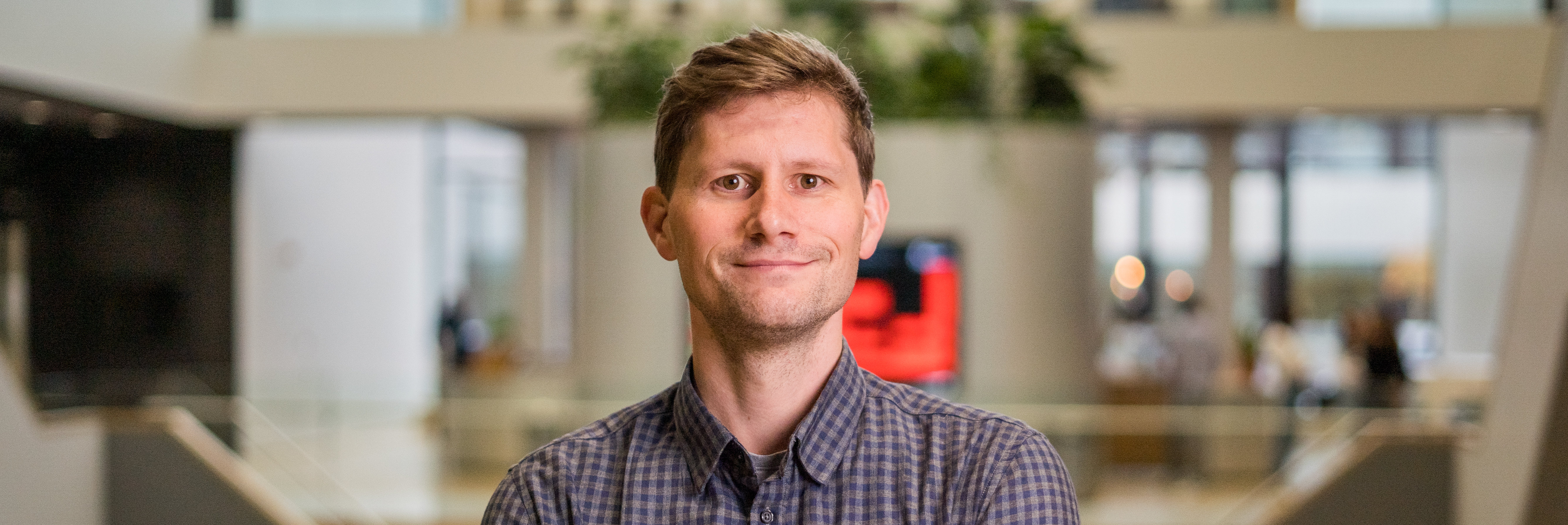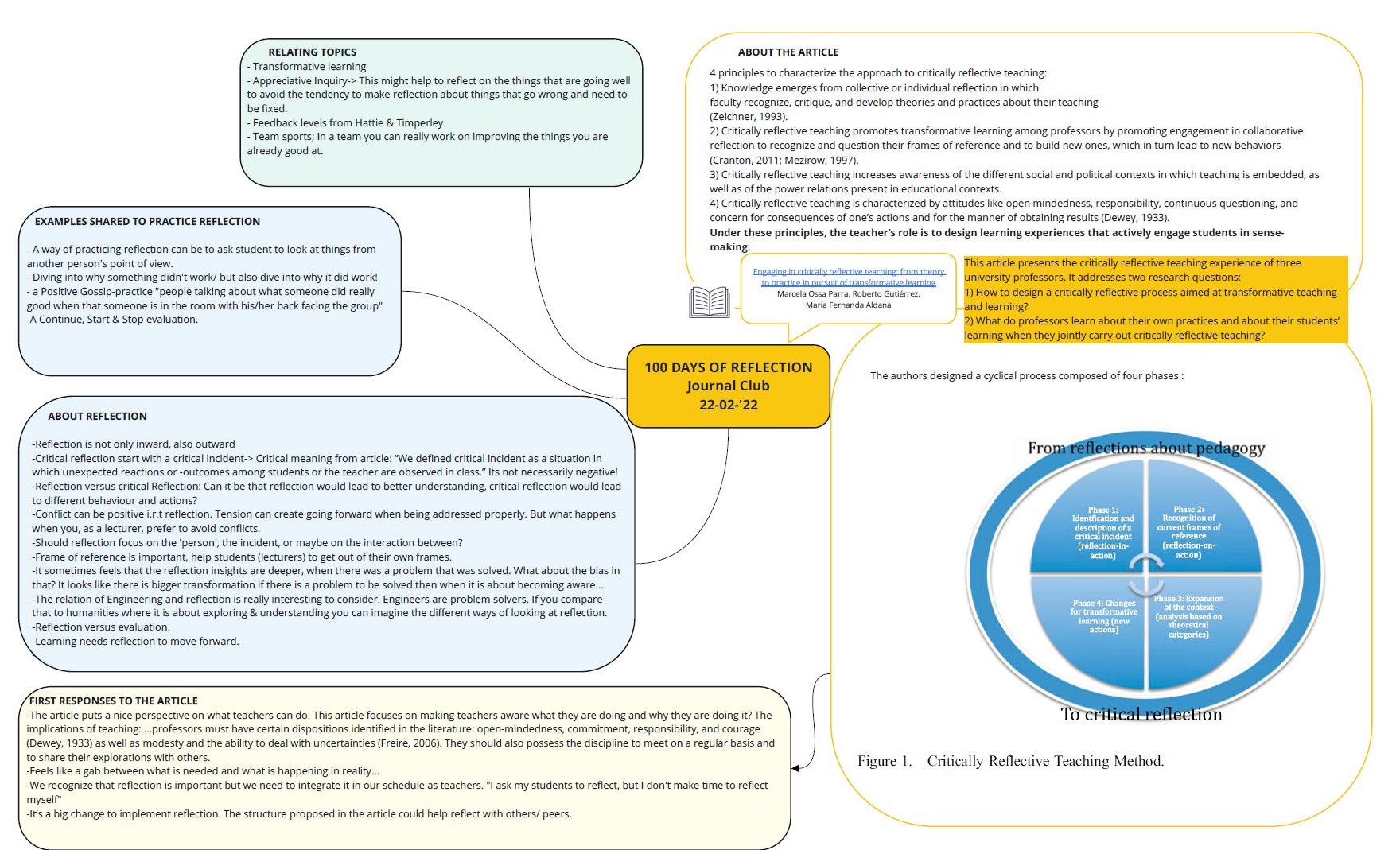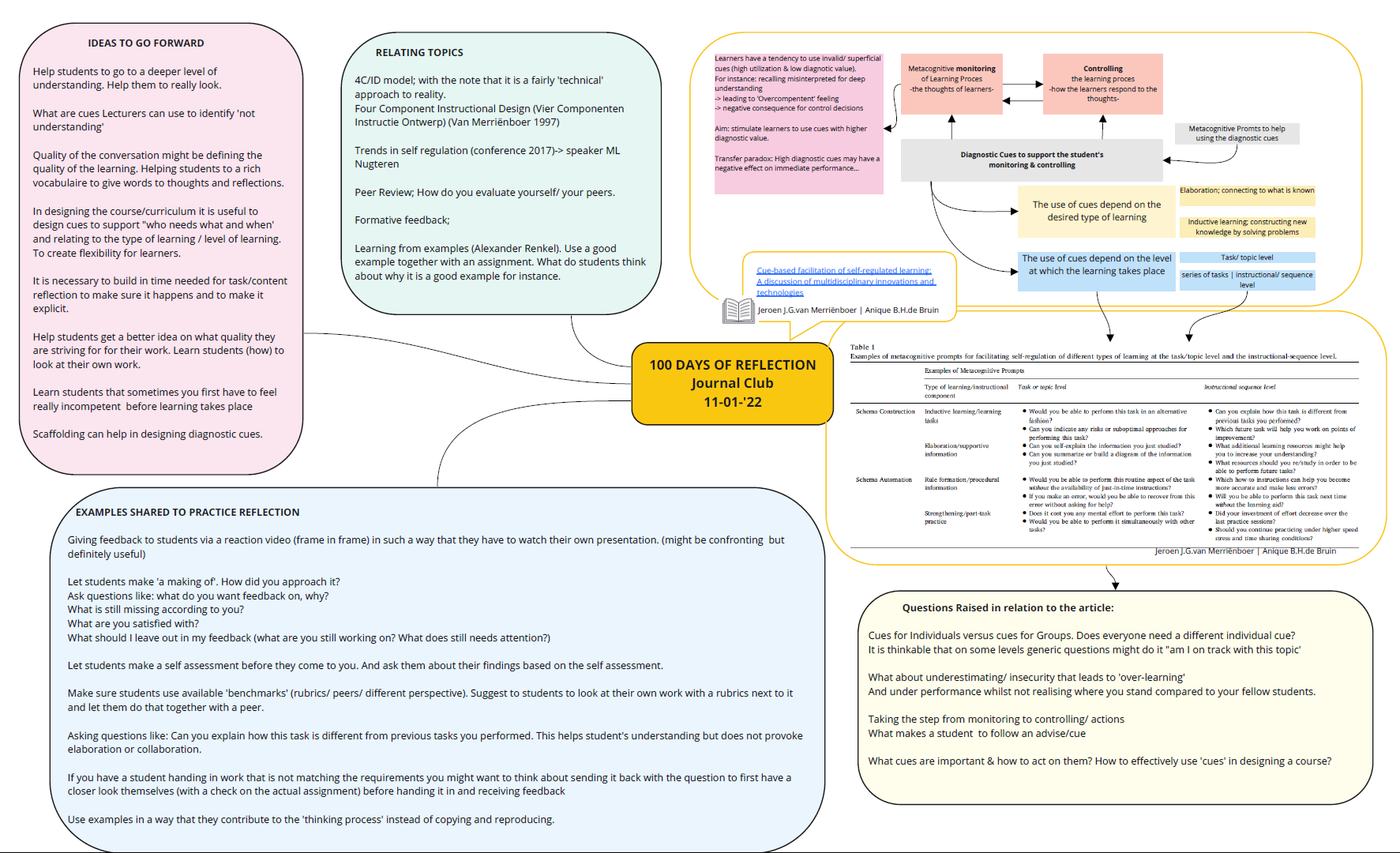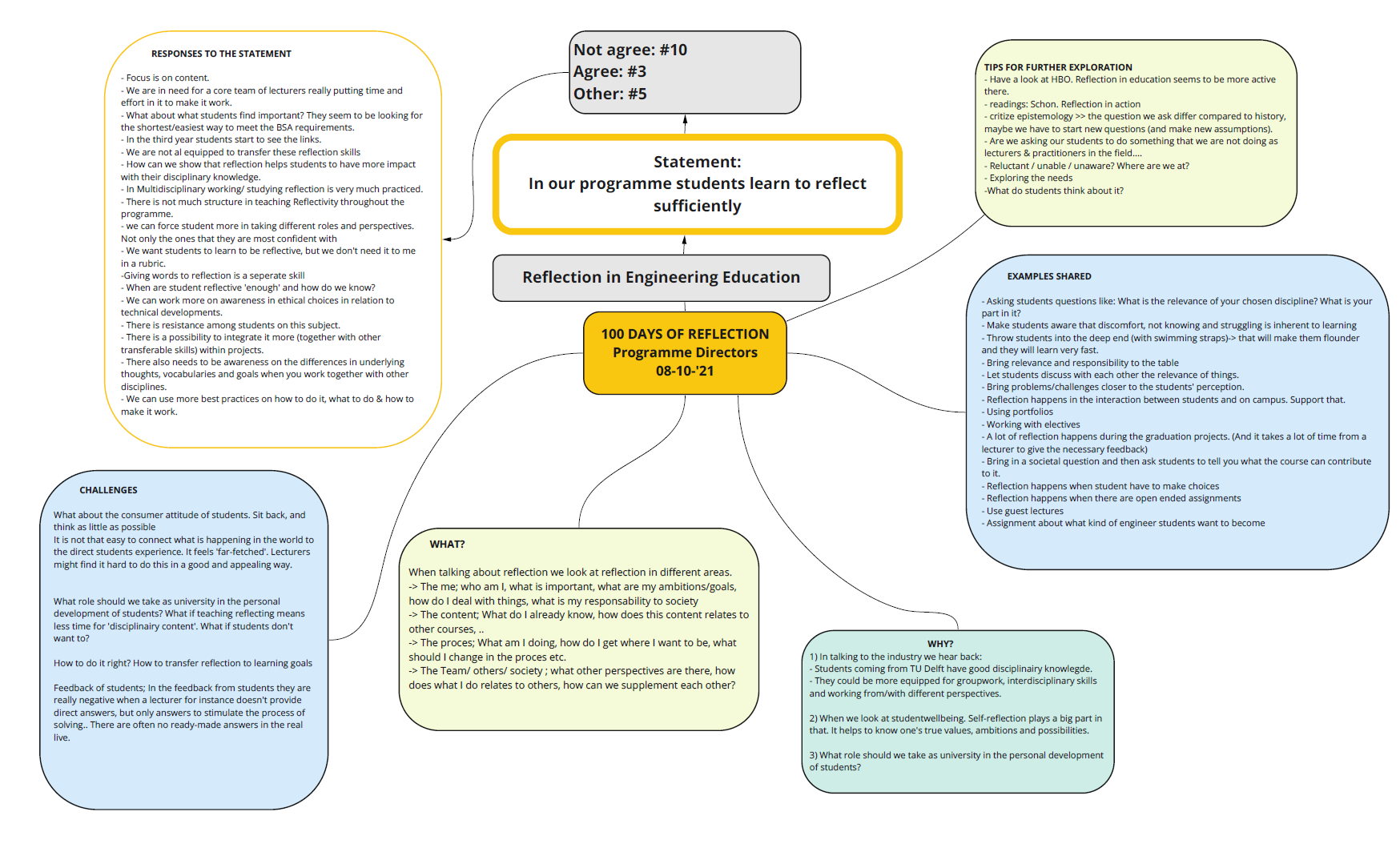100 DAYS OF.... Reflection in Engineering Education
Welcome to the overview page of '100 DAYS OF... Reflection' - an initiative to collaboratively explore reflection in TU Delft’s engineering education.
On this page, you find the Whitepaper 'Reflection in Engineering Education' and other outcomes and findings of our exploration during the 100 DAYS OF... Reflection.
-
The '100 DAYS OF' is an initiative organised by 4TU.CEE, LDE-CEL, TLS and the TU Delft Teaching Academy.
In the upcoming 100 days various events will be organised to collaboratively explore reflection in TU Delft’s engineering education.Reflection will be explored on different levels such as content, process, personal and interpersonal level and will be addressed via papers, publications, experiences, discussions and workshops.
The result of this '100 DAYS OF…' will be a 'whitepaper', showcasing lessons learned, considerations, research and ways to go forward for lecturers coordinators, and education management.
100 DAYS OF... Reflection
Organized by:
> 4TU.Centre for Engineering Education (4TU.CEE),
> Leiden-Delft-Erasmus Centre for Education and Learning (LDE-CEL),
> TU Delft Teaching and Learning Services (TLS),
> TU Delft Teaching Academy

Journal Club – 22 February ‘22
What does research tell us about reflection in engineering education?
In the “100 days of reflection” journal clubs we explore and discuss a (research) paper on reflection in engineering education. Following a flipped-classroom approach, participants read an article before the session (the specific article will be announced at least one week before the journal club date) and start an open discussion on the article with a moderator. The core question to be addressed is: what does research tell us on the role of reflection in designing teaching and learning to educate our future (socially responsible) engineers.
At the fifth Journal club in the "100 days of Reflection" series we discussed the paper "Engaging in critically reflective teaching: from theory to practice in pursuit of transofrmative learning".
Have a look at the visual summary of this session by clicking the image below.
Journal Club – 11 January ‘22
What does research tell us about reflection in engineering education?
In the “100 days of reflection” journal clubs we explore and discuss a (research) paper on reflection in engineering education. Following a flipped-classroom approach, participants read an article before the session (the specific article will be announced at least one week before the journal club date) and start an open discussion on the article with a moderator. The core question to be addressed is: what does research tell us on the role of reflection in designing teaching and learning to educate our future (socially responsible) engineers.
At the fourth Journal club in the "100 days of Reflection" series we discussed the paper "Cue- based facilitation of self- regulated learning: A discussion of multidisciplinary innovations and technologies".
Have a look at the visual summary of this session by clicking the image below.
Journal Club – 23 November ‘21
What does research tell us about reflection in engineering education?
In the “100 days of reflection” journal clubs we explore and discuss a (research) paper on reflection in engineering education. Following a flipped-classroom approach, participants read an article before the session (the specific article will be announced at least one week before the journal club date) and start an open discussion on the article with a moderator. The core question to be addressed is: what does research tell us on the role of reflection in designing teaching and learning to educate our future (socially responsible) engineers.
At the third Journal club in the "100 days of Reflection" series we discussed the paper "Reflection amplifiers in online courses: a classification framework".
Have a look at the visual summary of this session by clicking the image below.
Story of Education: Tom Burdyny – 25 November '21
“Our job is to inspire people to do good things when they move on in their future career”
The November edition of The Educator features an in depth interview with Best Lecturer of TU Delft 2021: Tom Burdyny. In the interview you can read how being a reflective person makes Tom eager to experimenting with teaching.
"I have always been very reflective on why some people have trouble explaining concepts to other people, while some people do so effortlessly. When I see that there is a miscommunication between people even though they are talking about the same thing, I often analyse why and how that happened.”
Curious about the full interview with Tom and about what else he has to say about reflectivity, read the full article by clicking here.

Journal Club – 26 October ‘21
What does research tell us about reflection in engineering education?
In the “100 days of reflection” journal clubs we explore and discuss a (research) paper on reflection in engineering education. Following a flipped-classroom approach, participants read an article before the session (the specific article will be announced at least one week before the journal club date) and start an open discussion on the article with a moderator. The core question to be addressed is: what does research tell us on the role of reflection in designing teaching and learning to educate our future (socially responsible) engineers.
At the second Journal club in the "100 days of Reflection" series we discussed the paper "The reflective zombie: Problematizing the conceptual framework of reflection in medical education".
Have a look at the visual summary of this session by clicking the image below.
Education Conversation – 28 September ‘21
Exploring Reflection in Engineering Education
The topic of the education conversation on the 28th was “Exploring Reflection in Engineering Education"
In this online Education Conversation we discussed together the role Reflection plays in engineering education.
In this exploration different questions were discussed.
Questions like:
• What defines a reflective engineer?
• Why is it important to support the students in reflection?
• What type of reflection do you see happening?
Have a look at the exploration below.
Journal Club 21 September
What does research tell us about reflection in engineering education?
In the “100 days of reflection” journal clubs we explore and discuss a (research) paper on reflection in engineering education. Following a flipped-classroom approach, participants read an article before the session (the specific article will be announced at least one week before the journal club date) and start an open discussion on the article with a moderator. The core question to be addressed is: what does research tell us on the role of reflection in designing teaching and learning to educate our future (socially responsible) engineers.
During the first Journal club (21 sept ’21) in the "100 days of Reflection" series we discussed the paper " Integrating Reflection into Engineering Education.".
A good starting point to explore reflection in Engineering Education.
Have a look at the visual summary of this session by clicking the image below.
Reference. Turns, J. A., Sattler, B., Yasuhara, K., Borgford-Parnell, J. L., & Atman, C. J. (2014, June). Integrating reflection into engineering education. In 2014 ASEE Annual Conference & Exposition (pp. 24-776).
Story of Education: Pleun Hermsen – The Educator September ‘21
“Reflection as a core competency”
Do the future engineers we educate meet the demands of our rapidly changing society? Are they equipped to deal with uncertainties and rapidly changing circumstances that are beyond their control? Can they collaborate and co-create with people from other disciplines to find solutions to complex problems? Are they able to continue to develop after university, to be critical and open to new and different insights?
According to colleague Pleun Hermsen, there is still a world to be won here and reflection is a key word. “To be able to educate the intelligent, responsible and cooperative engineer of the future, we need to ensure that self-reflection becomes integrated in the heads, hearts, and hands of our students, lecturers and programs”, she says passionately. Read more



